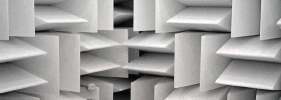In his introduction to The Audible Past, Jonathan Sterne explains the book’s concentration on an almost entirely elite, male, white, European/North American cast of characters as a natural corollary of the circumstances behind the historical development of sound recording technology. While this may (or may not) justify the exclusion from Sterne’s highly influential volume of… Read more »
Soundblog
3/31: Session 7. Aural Memory
One of the recurring motifs of our series thus far has been the uncanny ways in which our last few panels all seem to have fit better under the heading of the previous session. Mara Mills suggested that her session with Mark Butler could well have been called “Mediated Technologies” (while also observing astutely that… Read more »
Caufield Schnug: Sonic Torture, Everyday Listening

Caufield Schnug Sonic Torture, Everyday Listening After the news broke that U.S.-run detention centers used music as a method of physical and psychological torture for detainees, both academic circles and popular presses have been investigating the continuing critical relevance of the topic. In popular media, responses to accounts of sonic torture in secret prisons like… Read more »
Danny Walden: Music and the Brain (and History)

The stimulating papers by Vijay Iyer and Aniruddh Patel seek to bridge the (ever-shrinking) gap between humanities and cognitive science, in order to tackle fundamental enigmas that have puzzled composers, performers, theorists, and listeners for centuries. To select just a few: What is the nature of the relationship between speech and melody? What is musical… Read more »
3/11: Session 6. Sounds and the Brain
With our March 11 meeting, Hearing Modernity continues to explore some of the relationships between sound and body featuring a very exciting pair of presenters: Aniruddh Patel, “Two Surprising Connections between Sounds and Actions: A Perspective from Music Cognition” Vijay Iyer, “Improvisation, Action Understanding, and Music Cognition with and without Bodies” As always, the event… Read more »
Hayley Fenn: Hearing Through The Body
First, a confession: I don’t believe in Sound Studies. Okay – perhaps that needs some qualification. Rather, I do wholeheartedly believe in the study of sound: as a budding musicologist trained in historical enquiry, archival excavation, score-based analysis, hermeneutic possibilities (and many years ago now, I was actually able to play a couple of instruments!),… Read more »
Guest posts
Hearing Modernity is a multifaceted project built around our eight sessions of visiting presenters (with their papers) and a culminating talk by Jacques Attali. Other aspects include: the Intonarumori (Noise-Makers) series of sound artist talks at the Museum of Fine Arts (organized by Seth Kim-Cohen at the SMFA); a reading group (simultaneously online and in-person)… Read more »
Intonarumori at SMFA: Ultra-red
On February 10th, the School of the Museum of Fine Arts was visited by Ultra-red, as a further installment in the ongoing Intonarumori lecture series – occurring in combination with Hearing Modernity. Ultra-red is a collective of artists, researchers, and organizers, focused on “exploring acoustic space as enunciative of social relations.” In their mission statement, Ultra-red describe… Read more »
Christopher Hasty: Response to Butler and Mills + Conversation in/on Sound
As with some of the past sessions, we post here a transcript of the response by Christopher Hasty, as well as a later exchange between Mara Mills for Mark Butler on tensions between affordance and entrainment. These fragments highlight content from the session podcast, which can also be accessed from the ride sidebar of the… Read more »
2/24: Session 5. Hearing through the Body
Tomorrow marks the beginning of our spring events for Hearing Modernity, with a session, “Hearing through the Body”: Mara Mills, “Earless Hearing” Mark Butler, “Cycling, Going, Grooving: On Repetition and Dynamism in Electronic Dance Music” As always, the event starts at 4:15 pm in Holden Chapel in Harvard Yard. Precirculating papers are available here (contact… Read more »



